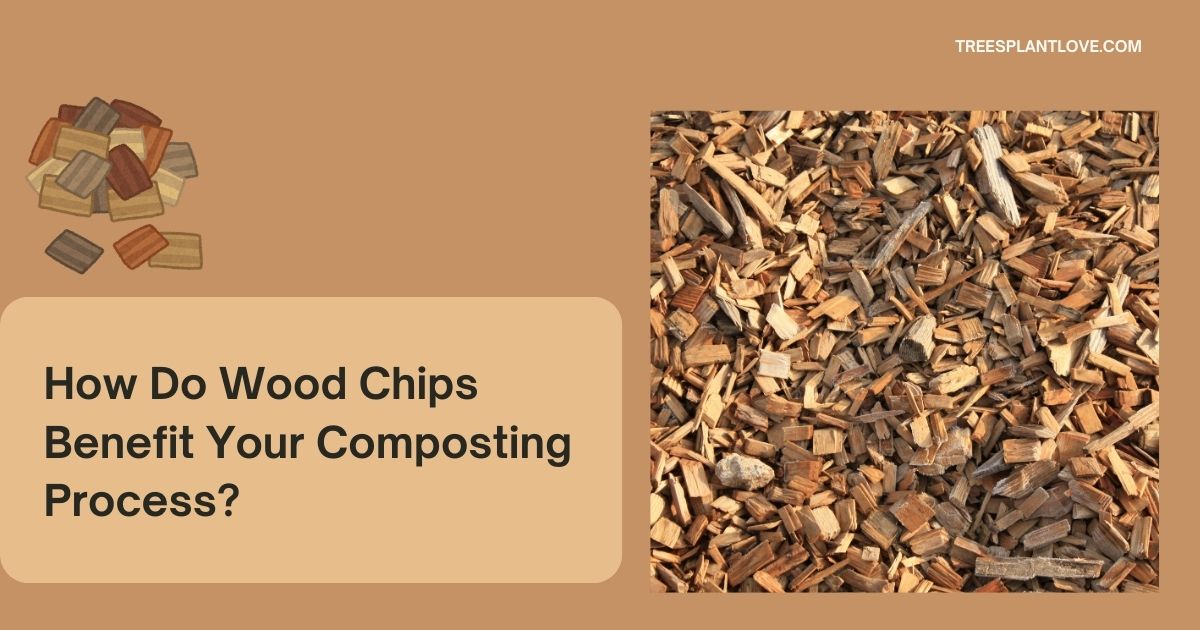
How Do Wood Chips Benefit Your Composting Process? Enhance Decomposition & Improve Soil Health
How Do Wood Chips Benefit Your Composting Process?: Composting is a simple yet powerful way to recycle organic waste and turn it into nutrient-rich soil that can enhance the health of your garden. While many people are familiar with the basics of composting, such as adding fruit and vegetable scraps, leaves, and grass clippings, one component that often gets overlooked is wood chips.
These small, woody pieces may seem like a minor addition, but they can offer a variety of benefits when it comes to improving your composting process. So, how exactly do wood chips help your composting efforts? Let’s explore the key benefits they bring to the table.
Enhancing Aeration and Oxygen Flow
One of the most important factors in successful composting is maintaining proper airflow within the compost pile. Oxygen is essential for the microorganisms that break down organic matter, and a lack of air circulation can result in a sluggish composting process or even unpleasant odors.
Wood chips, with their rough texture, help create air pockets within the compost pile. When added to the compost mix, they promote better airflow, which facilitates aerobic decomposition (the type of decomposition that requires oxygen). This enhanced aeration speeds up the composting process, helping your pile break down more efficiently and reducing the chance of the pile becoming too wet or compacted.
Improving Carbon to Nitrogen Ratio
The key to a successful compost pile is the right balance of carbon (C) and nitrogen (N). Too much nitrogen can cause the compost to become too slimy and smelly, while too much carbon can slow down the decomposition process. Ideally, your compost should have a ratio of about 30 parts carbon to 1 part nitrogen.
Wood chipsare high in carbon, which helps balance out the nitrogen-rich materials like food scraps and grass clippings in your compost pile. By adding wood chips, you’re providing a slow-release carbon source that ensures the microbes in your pile have a steady supply of food. This balanced ratio promotes faster, healthier decomposition and creates nutrient-dense compost.
Preventing Compaction and Improving Drainage
Over time, compost piles can become compacted, especially if they contain materials that retain moisture. When this happens, the decomposition process slows down, and it becomes more difficult for air to reach the inner layers of the pile.
Wood chips, with their larger size and fibrous nature, help to prevent this compaction. They act as a kind of “mulch” in the compost, keeping the pile loose and ensuring that moisture drains properly. This also helps prevent the compost from becoming too soggy, which can create a breeding ground for anaerobic bacteria (the kind that produces foul odors). By improving drainage, wood chips help maintain the ideal moisture level in your compost, keeping it in the perfect condition for efficient breakdown.
Contributing to Long-Term Fertility
As wood chipsbreak down, they slowly release beneficial nutrients back into the soil. While they are high in carbon and relatively low in nitrogen, they still contain small amounts of nutrients like potassium, phosphorus, and calcium. As they decompose over time, wood chips contribute these nutrients to the compost, enhancing its overall nutrient profile.
Additionally, the slow decomposition of wood chips means they add long-term value to the compost. Unlike faster-decomposing materials like food scraps or grass clippings, wood chips decompose slowly, providing a steady release of nutrients to plants in the long term. This can result in compost that is more balanced and better able to support plant growth over an extended period.
Adding Bulk and Volume to the Pile
Composting requires a certain volume of material to generate enough heat and activity to break down organic matter effectively. If your pile is too small, it may not generate enough heat to decompose the materials properly. Adding wood chips to your compost pile can increase its bulk and volume, giving it the size needed to maintain the right temperature for decomposition. A larger pile also helps retain heat more efficiently, speeding up the composting process.
Reducing Odors
A common problem in composting is the formation of unpleasant odors, particularly if the pile becomes too wet or too high in nitrogen. When added in appropriate amounts, wood chips can help reduce these odors by absorbing excess moisture and balancing the nitrogen content in the pile. By promoting better aeration and moisture regulation, wood chips help ensure that your compost pile remains odor-free and pleasant to manage.
Creating a Habitat for Beneficial Microorganisms
Composting is driven by microorganisms that break down organic matter. While some microorganisms thrive in moist, nitrogen-rich environments, others prefer drier, carbon-rich environments. Wood chips create a habitat that encourages a variety of microorganisms, including bacteria, fungi, and beneficial insects, all of which play a role in the decomposition process.
By adding wood chips to your compost, you’re creating a diverse and thriving ecosystem that can break down organic material more efficiently. The woody fibers of the chips also provide surface area for fungal growth, which is essential for breaking down more complex organic matter such as cellulose in plant stems and leaves.
Reducing the Need for Additional Carbon Sources
When composting, it’s essential to maintain a balance of green (nitrogen-rich) and brown (carbon-rich) materials. If you’re composting mostly food scraps or other green materials, you may find yourself needing to add extra carbon sources to maintain the right balance. Wood chips are an excellent brown material that can reduce the need for other carbon-rich additions like straw, leaves, or shredded paper.
By using wood chips, you simplify your composting process and ensure that you have a consistent source of carbon available to maintain an ideal C:N ratio.
Conclusion
Wood chipsmay seem like a simple addition to your compost pile, but their benefits are multifaceted and significant. From enhancing aeration and improving the carbon-to-nitrogen ratio to helping with moisture control and reducing odors, wood chips play a vital role in optimizing the composting process.
If you’re looking to speed up decomposition, reduce odors, and produce nutrient-rich compost for your garden, incorporating wood chips into your compost pile is an excellent choice. Not only do they enhance the quality of your compost, but they also support a healthy and thriving ecosystem within your compost pile, ensuring that you produce the best possible material for your plants. So next time you’re ready to compost, don’t forget to add some wood chips to the mix—they’re the secret ingredient to a healthier, faster, and more efficient composting process.

Leave a Reply